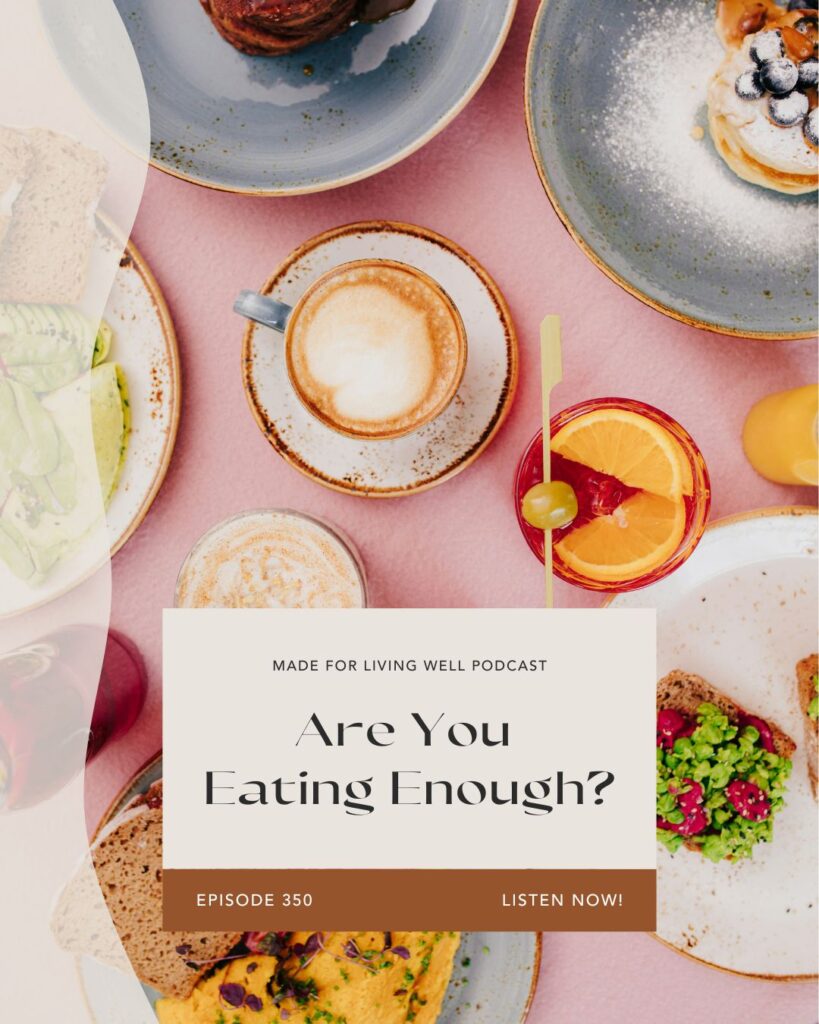
Listen on iTunes | Listen on Spotify | Listen on YouTube | Review the Podcast
The health space often boxes everyone into a single narrative: if you’re overweight, you must be overeating. But that’s not always true. In fact, undereating can lead to many of the same problems as overeating.
Surprisingly, most people today are underfed—not just in quantity but in quality—leading me to ask: are you eating enough?
One of the most comprehensive studies on the effects of undereating is the Minnesota Starvation Experiment. This yearlong study documented what happened to participants during prolonged semi-starvation and explored the process of refeeding. I believe it offers a great understanding of the impacts of under-eating and how to better understand the effects of food on one’s physiology.
Inside this podcast, I dive deeper into the Minnesota Starvation Experiment and discuss why undereating is a hidden problem in the health space. I also explain how chronic undereating leads to metabolic adaptation, triggering a cascade of health issues.
One thing I never understood…
Food has always been at the heart of my journey into the nutrition space.
Let me explain.
Growing up in the ’80s, ’90s, and early 2000s, diet culture was everywhere. It seemed like everyone around me was jumping from one extreme diet to the next. Each promised quick results, but all came with one common denominator: restriction.
I couldn’t understand it. Maybe it was because I genuinely loved food, or maybe it was because I saw how these diets consumed lives without delivering the joy or freedom they promised. Instead, they often left people feeling more miserable than when they started.
I hated that pursuing health required so much effort while also draining people of the happiness and joy inside them. Even worse, few ever found the results they were chasing. In nearly every situation, it felt like a lose-lose situation.
The goal (or hope) was always weight loss—a number that so many believed would unlock their worth or place in the world.
This mindset has fueled a “food war,” branding food as the enemy and restriction as honorable. Fast forward 20+ years, and we’re finally starting to see how unsustainable this narrative has been. Not only has it failed to achieve lasting results—statistics show obesity rates continue to rise—but it has also left many with a damaged metabolism and broken relationship with food.
But here’s the good news: it doesn’t have to stay this way. Change is possible.
The paradigm shift you need to adopt in health.
However, that change requires a complete paradigm shift in how we view food and our bodies. Leaving me to ask you, honestly, what if your struggles with weight and health stem not from eating too much but from not eating enough?
What if the old ways of restriction, elimination, and starvation have actually been working against you—making your body less healthy and your goals harder to achieve?
It’s a hard question but one worth asking. Because the path forward isn’t about playing the same game—it’s about redefining the rules entirely.
Are You Eating Enough?
In health, the assumption is often that most people consume too much. As a result, over 90% of health practices revolve around restrictions: eating less, cutting back, and eliminating.
It’s a confusing message because, yes, true weight loss does involve a period of eating less. But here’s the key: that phase only works if you have enough to pull from in the first place. Your body needs to start in a healthy caloric range before effectively dropping into a weight-loss stage and later returning to an optimal maintenance phase.
Most people miss this crucial detail. They don’t realize that most of their lives will be lived in maintenance—not in a calorie deficit. Anything different forces the body into survival mode, which is neither healthy nor sustainable.
There’s a specific process to losing weight the right way, one that ensures you maintain it long-term while losing the right kind of weight—body fat, not muscle or vital tissue. That process starts by consuming enough to support your body.
It’s the process of reverse dieting.
Reclaiming The Purpose of Health
I understand that this conversation might feel backward compared to the typical approach to health. But let me remind you—this “typical” approach has been around for centuries, and it’s not working.
Health framed as reduction—eat less, restrict more—actually works against the true purpose of health. And that purpose is simple: to support your body.
Health should always be measured by how well it resources your body, equipping it with the tools or “ingredients” it needs to function as it was designed. Whether the task is healing, restoring, rebuilding, or losing, your body will do the job—when it has the nutrients and resources available.
When it doesn’t, it compensates. Your body prioritizes essential functions while dialing back non-essential ones. Over time, this compensation creates imbalance and disharmony, leaving many to respond with even more restriction—a cycle that only deepens the problem.
But here’s the truth: health isn’t about reduction. Health is about expansion.
It’s about adding the resources your body needs. It’s about adding tools, nutrients, and ingredients so your body can pull what it needs, when it needs it, to create health and help you live it out.
Your body is capable of living well—are you providing what it needs?
In my last podcast episode, I outlined my three non-negotiables required for health. With these in place, your body can thrive because that’s what it’s designed to do. Without them, your body is forced to compensate, creating a cascade of issues—not because it wants to, but because it doesn’t have the resources to do otherwise.
Trust your body. Respect it for doing its best with what it has. Your body is fully capable of living well, but you must provide it with the resources to make that possible.
10 Simple Ways To Add More Resource To Your Life
Don’t overthink it. Here are ten simple ways to add resources to your life. Remember, the goal is expansion, not reduction—adding, not limiting.
- Drink more water—hydration is key.
- Add a vegetable to every meal—nutrients matter.
- Eat balanced meals—protein, fat, and carbs all play a role (and all are required).
- Get more sleep—rest is a resource too.
- Take deep breaths—oxygen supports every function.
- Step outside daily—nature and sunlight replenish energy.
- Include healthy fats—they’re essential for brain and body health.
- Move your body daily—don’t complicate it, just move more often.
- Incorporate fermented foods—to support your gut.
- Build healthy relationships—life was meant to live in community.
Expansion is about adding what supports your body so it can do its job—living well. Start small, and let these simple additions build momentum.
Nourish your body to get healthy (and lose weight).
Nourishment is the foundation of health. It’s the essential element your body, mind, and soul need to thrive. While there are countless ways to nourish yourself—and they’ll change with the seasons and your circumstances—it’s important not to get overwhelmed by chasing the “perfect” system. Instead, trust your internal wisdom and focus on what truly supports your wholeness.
Nourishment isn’t just about healing your body; it’s about empowering you to live your purpose. It’s about nurturing your mind and soul so you can show up fully as your whole self. True health is what allows you to live out your wholeness.
In my course, Health Made Simple, I guide you through the process of nourishing your mind, body, and soul to create balance and healing. It’s a practical toolbox designed to help you resource your life, restore your energy, and embrace your health.
A new round of Health Made Simple is opening soon, and I’d love for you to join! Let’s create the health and wholeness you were meant to live.
Are You Eating Enough? Additional Articles:
Dive into weekly inspirations and strategies for simple, sustainable health in The Weekly Fill newsletter. Check out past editions and subscribe at The Weekly Fill.
- The Connection Between Your Mind and Metabolic Health
- How To Build Metabolic Flexibility
- What Is Metabolic Eating? Every Detail You Need To Know
- Boost Your Metabolism By Living Seasonally
- Is Intermittent Fasting Bad For Your Metabolism?
